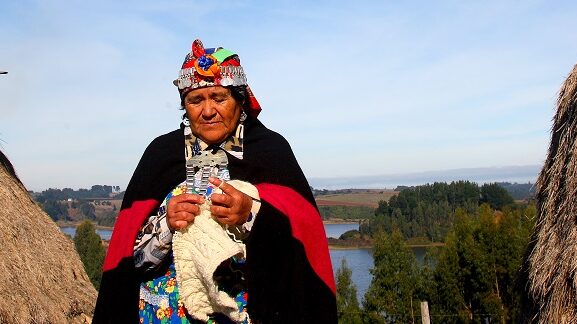In December of 2022 a woman with silver jewellery on her forehead and chest, black and white decorative dress and a voice full of memory and strength, addressed the 800 or so women in the aula. The speech was given during the Women Weaving Future international conference in Berlin. It was a historically important event where women of all cultures and geographies of the world met and it was followed over live broadcast from many parts of the world.
Her name is Juana Paillalef and she is a lonko (chief) of the lof (community) of Juan Paillalef, part of the Mapuche people-nation in South Abya Yala (an idigenous name for Latin America) and she is telling the participants about the struggle of the Mapuche and their culture. They have managed to resist against colonization for nearly 500 years but today the attacks occur in different ways from before. The 200 year old nation-state of Chile is today led by a progressive government with a president that was a prominent leader in the student revolts of 2011 and 2019. In spite of this the years under the progressive government have been some of the worst for the Mapuche people-nation in their joint history with civilization. The militarization of their land, the attacks on their villages and homes from part of the military and carabineros (chilean military police) and the terror spread by the paramilitary groups hired by the logging companies that are exploiting their ancestral lands, is worse than ever.
The Mapuche people have a 4000 year old history on those lands and it is a history of a deep co-living with the forest, rivers, ocean and mountains. With them, as with many other ancestral cultures, there are many things we can learn about ourselves if we study their history and culture. If we have learned something from Abdullah Ocalans re-readings of the history of the Kurdish people it is that “we are hidden in the dawn of history and our present is hidden in history”. When we study the history of peoples we are uncovering a treasure of lessons about our own potential as human beings. But we also learn something about the depth and detail of the oppression developed by civilization and the history of the Mapuche people-nation is no exception. Especially when studying their language, the Mapudungun, we gain some clues to the impact of the technology of writing on our way of thinking.
The Mapuche populate the south part of the Southern Cone of the Patagonia and Pacific coast, or the land that today is colonized by the nation-states Chile and Argentina. They live in some of the coldest lands of the continent and their way of life encompasses villages by the ocean, the Andean mountains and the deep ancestral araucaria forests.
During the colonization of Abya Yala by the Spaniards and the Portuguese, beginning in the late 1400’s, they were one of the few indigenous cultures that managed to keep the colonizers out of their territories with their resistance. They were skilled warriors, workers of their land, had deep knowledge about the plants and the animals and a spiritual connection to their territory. They managed to defend these values and among them also their language against the dangers of colonization. The real blow against their culture came with the foundation of the nation-states of Chile and Argentina, a bit over 200 years ago. The methods of colonization changed from confrontational war to a deeper kind of bureaucratic, administrative and military war. Laws were used to seize their land, industrialism was used to displace their people to the cities and they went from about 1 million to 300 thousand in a couple of centuries.
Today the struggles they wage against the post-colonial state are as diverse as is their tribal heritage and organizational system. Every tribe is organized in their own political and territorial structure and it is difficult to talk about one political line of struggle. This dispursement is possibly what has enabled them to resist until this day. Some tribes and communities are united around the idea of territorial control, which means taking back their ancestral lands without asking for permission from the government. This has revived an armed struggle which reminds us of the uprising and resistance against the Spanish colonizers and the brutal wars against the nation-state armies during their war campaigns against the southern lands in the late 1800’s. The resistance is not just about territory but it is connected to what those territories have meant for them during their millennial histories. The land gives life and the opportunity to cultivate culture and identity. Ancestral traditions, cosmogony and language are all connected to the opportunities that the land has offered. Therefore it is impossible to separate the cultural heritage from the earth and water that has nurtured their culture and identities.
The Mapudungun language is one of these cultural values and it contains many aspects that mesmerize us and teaches us things about natural societies, symbolic intelligence and through it we also learn about the system that attacks the values of peoples, the civilizational capitalistic system.
In Mapudungun “mapu” means land and “dungun” mean speech forming the meaning “speech of the land”, similarly “che” means people forming the name “Mapuche” or “people of the land”. In terms of the roots of the language scholars are still debating the history of Mapudungun and there is no clear consensus around its linguistic roots. There are approximately 202 thousand people who speak the language, which is only a small part of the total Mapuche population which has today increased to about 1.5 million. They have been put through harsh politics of assimilation but in spite of this the local Spanish dialects have inherited many words from Mapudungun (like “guata” which means belly or “quiltro” which means a mut, or a mixed race dog), making it impossible to deny the existence and importance of this culture. Furthermore the influence between the Inca culture and the Mapuche culture is also reflected in the interchange of words. Partly this can be explained by the trade of goods that has been made first between the Inca and the Mapuche, and later between the Spaniards and the Mapuche. The cultural exchange even reached a time when there was a bilateral parliament including both Mapuche and Spanish delegates, called the Parliament of Quillin.
This interchange of culture and through that the interchange of words also points to a characteristic of both culture and language. It does not obey laws or borders as sometimes nation-states want to make it seem, as though culture and language can be regulated and frozen in time. This is also one of the characteristics of Mapudungun which makes it interesting to expand on. Since most of its history it has been a language free from writing, in other words a fully oral culture, it also has a very free flowing character. When words are not frozen in time and meaning, they tend to change with time and space. As an example, if we want to translate the word “alwe” which in a very simplified way means “primal soul” or “animal soul” we have to venture into a very long explanation to capture all of the different aspects of this word. It is an attempt to distinguish between the basic soul and the second soul, which is closer to the psychological or mental realm of the spirit. This explanation is by far not enough to capture the full meaning of this word since it has a deep spiritual meaning that has developed over thousands of years. Words in a verbal culture tend to change and develop depending on the context where it is used, who is using it, between whom it is used and where it is used, in a geographical sense but also in a semantic sense.
The Mapuche cosmogony has developed in parallel with the language over the millennia and the meaning of spiritual concepts have deepened and changed over time and space. In a way this is the natural way for language to develop when we do not tie it down to a written symbol to represent the meaning of those words. The written language has a tendency to limit meaning of words to what is specified as its meaning at that specific time and place. Since the earliest example of the conception of written language, about 5000 years ago in Sumeria in what we today know as Iraq, it was very closely connected to the emergence of the state and patriarchy since it became a central tool to administer the growing surplus from exploitation practiced by the temple-state. As power tended to concentrate around the temple and the priest cast at the top, the need to document what was owned and how much of it was owned, increased. The need to write and document grew as the people who owned and controlled the product became an ever smaller group while controlling an ever larger society.
As with most inventions this doesn’t mean that the dominating cast suddenly decided to invent writing for this purpose. But the opportunistic character of the dominating caste and its practice of taking and keeping tools, both material and immaterial, from society and securing control over them through force, made sure that the scribes, the people who knew how to write, came under the control of the temple-state. With time this structure developed in complexity. Today the documenting and defining power is under state control through state bureaucracy, business administrative corporations and universities.
“Men only need the power of technology when they acquire property. This is why they develop writing. In temples, technical matters such as the number of slaves, the food they give to the slaves, how many slaves to send, etc. require writing. Writing is not sacred, it is a technical tool and is related to colonialism.” -Abdullah Ocalan
One of the tragic effects of the development of written language is the narrowing of meaning of words and the tendency to reduce words to standardized meaning. It might be difficult to experience what it would be like to grow up in a paradigm where language is free and develops organically in relation to how our culture and society grows, but the Mapudungun language gives us a clue to how this could be.
Of course this doesn’t mean that we can or should deny the worth of written language. Thanks to it we are communicating over space and time, me as an author and you as a reader. But we have to identify the roots of written language, the role it has had in supporting the development of civilization and bureaucracy to also be able to free ourselves from the destructive effects it has had on our cognitive capacity and how it has developed our reductionist mentality and world view. As with many other things, writing in itself is a neutral tool, but in the hands of the patriarchal state it becomes a weapon against society. We have to study it and understand it so we can liberate it from these shackles and turn it into a tool for the liberation of the human mind and spirit, just as the spoken culture has been for the Mapuche people-nation, and possibly for all of us before the invention of writing.

